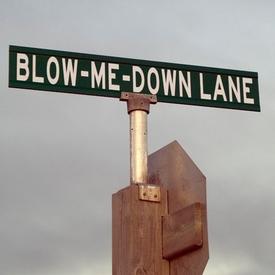Why the 80% diet 20% exercise rule?
Replies
-
No, because there is no difference. Food is 'calorie count'. Exercise is 'calorie count'. BMR is 'calorie count'. Count the calories in, count the calories out.
Sure, you can lose if you keep your diet the same but also exercise enough to have a calorie deficit. But in the end it's the calorie count that is making you lose weight, not the exercise. Do you understand the difference?dramaqueen45 wrote: »I think it's possible to lose on just exercise- my husband has lost about 16 pounds not really changing his diet but he took up walking daily and lifting as well as swimming...
0 -
Just to throws this out there: The 80-20 rule is a commonly used principle in business, economics, and even natural sciences. It's also known as the "Pareto Principle" and roughly states that 80% of effects come from 20% of causes.
So in weight loss, you can get most of your deficit (80% of it) from the fairly easy step of cutting back on food (20% of effort). I don't think this is exactly correct but it is a useful framework to help guide the discussion.
People invoke the 80-20 rule because many new dieters think that they have to get all exercised up, join a gym, work out until they are exhausted, etc., when in fact most of the results come from just cutting back some on food.
http://en.wikipedia.org/wiki/Pareto_principle0 -
Workout4Health wrote: »
What's false around that information? It's spot on.
Eat less calories than you burn and you will lose weight (which is the same as CICO and what Psulemon said).0 -
Just to throws this out there: The 80-20 rule is a commonly used principle in business, economics, and even natural sciences. It's also known as the "Pareto Principle" and roughly states that 80% of effects come from 20% of causes.
So in weight loss, you can get most of your deficit (80% of it) from the fairly easy step of cutting back on food (20% of effort). I don't think this is exactly correct but it is a useful framework to help guide the discussion.
People invoke the 80-20 rule because many new dieters think that they have to get all exercised up, join a gym, work out until they are exhausted, etc., when in fact most of the results come from just cutting back some on food.
http://en.wikipedia.org/wiki/Pareto_principle
I've been thinking about that every time I saw this thread. But I'm not sure that I would call cutting back on food easy. I find it easier to exercise, because that is a positive action I can take. If I go ride my bicycle, that is something I've done and an hour after I've finished I can't not ride my bicycle for the day. But cutting back on food requires a continuous decision to not eat. I can go all day without eating too much, but five minutes before the end of the day, I can open the refrigerator and blow my success for the whole day.0 -
I have to diet and exercise to move the scale, diet alone is toooooo slow for me. Mind you I sit at a desk all day long for work.0
-
You CAN lose weight just by exercising more. However, most normal people who aren't on The Biggest Loser can't exercise at high intensity for 6 or 8 hours a day. There is a limit to how much most people can reasonably burn through exercise in a typical day...usually just a few hundred at most. So if you choose to rely on exercise, your weight loss will be much slower, though it will still happen.
However, one really big meal or day of frequent snacking can easily add more calories than that. What and how much you eat is the bigger part of the equation. Even people on very calorie restricted diets eat over a thousand calories every single day and some eat much more...most only exercise a few hundred calories at most, and usually not every day. The math favors diet.0 -
Please help me understand why this is the general assumption to weight loss. I'll try to keep my thoughts simple using the example below:
A female athlete eats 2500 calories and burns 500 calories with exercise to maintain weight X. She stops her training and leads a sedentary life whilst still eating 2500 calories. Over time she gains weight until she reaches weight XY. She maintains this weight for a number of years. If she starts her athletic training again, burning 500 calories whilst still eating 2500 calories, my simple brain tells me that she would loose weight until she reaches weight X.
Is that not weightloss due 100% exercise?
There's no "rule"...it's just generally easier to control weight via consumption. Weight control is all about energy balance and it's a heck of a lot easier to balance everything out with energy consumption...eating to support your current activity and weight control goals.
0 -
Thank you all for your input. What I have gathered from all your comments is that theoretically it is possible to lose weight just by adding vigorous exercise without increasing calorie intake but practically/in real life its very hard to do it that way.
Yes, and to add to this thought. You will get a lot of comments that start like this: "That's not true my _______, lost 10 lbs in 30 days doing that" The key for me in that statement is the relatively short amount of time. Anyone can do something for a short amount of time. But can they maintain that pace, or habit for 6 months, a year, 2 years? Losing weight and becoming more healthy is a lifestyle. When someone mentions the 80/20 rule, they mean in order to stay healthy you need to focus on your diet. Because, as you get older you won't always be able to work-out like a maniac. I have a sprained foot right now. You will get other injuries. Life will get in the way. It will get cold outside, and they will close the pool for a swim meet. Just stuff to keep in mind.
0 -
TimothyFish wrote: »Just to throws this out there: The 80-20 rule is a commonly used principle in business, economics, and even natural sciences. It's also known as the "Pareto Principle" and roughly states that 80% of effects come from 20% of causes.
So in weight loss, you can get most of your deficit (80% of it) from the fairly easy step of cutting back on food (20% of effort). I don't think this is exactly correct but it is a useful framework to help guide the discussion.
People invoke the 80-20 rule because many new dieters think that they have to get all exercised up, join a gym, work out until they are exhausted, etc., when in fact most of the results come from just cutting back some on food.
http://en.wikipedia.org/wiki/Pareto_principle
I've been thinking about that every time I saw this thread. But I'm not sure that I would call cutting back on food easy. I find it easier to exercise, because that is a positive action I can take. If I go ride my bicycle, that is something I've done and an hour after I've finished I can't not ride my bicycle for the day. But cutting back on food requires a continuous decision to not eat. I can go all day without eating too much, but five minutes before the end of the day, I can open the refrigerator and blow my success for the whole day.
I agree with this, which is what I meant by "not exactly correct". I personally would rather exercise and earn 500 calories than cut 500 calories and not exercise.0 -
not a rule, it's a guideline or advice. You are what you eat... literally. Picture that. Exercise makes you fit and tones you under your fat, fat loss is your diet. you will lose weight at first with exercise, but, long term you'll gain it back if you don't change what you are eating and how.0
-
You cannot out-exercise a bad diet. Period. 30 minutes walking may burn around 200 calories. If you over-eat by 600-1200 calories per day, you'd have to walk 3-6 hours to burn it off.0
-
TimothyFish wrote: »One problem that people who exercise have is that they tend to eat more when they exercise, so they won't actually lose weight. That being said, I find that it is very difficult to create a calorie deficit without exercise. It is possible, yes, but it is more difficult.
I think most people would be better off if they would focus more on exercise than on diet. When your goals are exercise based, you aren't thinking so much about having to cut out certain foods or some number of calories. Instead, you are thinking in terms of how you can go faster or perform longer. Your focus on food becomes a focus on fueling your workout rather than eating for pleasure.
Why focus on exercise when a surplus of food is actually the problem to weight gain?
In my example there was no 'surplus of food' but rather a reduction on exercise. She was on a 2500 calorie the whole time. The only thing that changed was her activity.
In your example the person maintains at 2000 NET calories and gains at 2500 NET calories. In order to lose weight they would need a deficit below that 2000 NET calorie mainanence level.0 -
I was a WW leader and receptionist. As you probably know, one has to be a lifetime, maintaining-goal-weight member to be a leader or receptionist at WW. The biggest commonality to us was that we all did some form of cardio on a routine basis. I know this is completely anecdotal, but I found it to be true - we moved. We walked, we swam, we ran, we bicycled, we ellipticaled, we danced, we zumba'd. . .we all moved 3 or more times a week. That is how we kept the weight off. We ate, oh man, when I went to leadership training, I was with a pack of wolves - we tore into our food and left only crumbs! But then that evening, there was a waiting list for the hotel exercise equipment, and even though there was snow on the ground there were ladies out walking and running.
Everyone knew, you want to maintain? You move. You can stay slender without moving, but it sucks to be you, because you will be hungry all the time.0 -
Abs are made in the Kitchen not the Gym0
This discussion has been closed.
Categories
- All Categories
- 1.4M Health, Wellness and Goals
- 398.1K Introduce Yourself
- 44.7K Getting Started
- 261K Health and Weight Loss
- 176.4K Food and Nutrition
- 47.7K Recipes
- 233K Fitness and Exercise
- 462 Sleep, Mindfulness and Overall Wellness
- 6.5K Goal: Maintaining Weight
- 8.7K Goal: Gaining Weight and Body Building
- 153.5K Motivation and Support
- 8.4K Challenges
- 1.4K Debate Club
- 96.5K Chit-Chat
- 2.6K Fun and Games
- 4.8K MyFitnessPal Information
- 12 News and Announcements
- 21 MyFitnessPal Academy
- 1.5K Feature Suggestions and Ideas
- 3.2K MyFitnessPal Tech Support Questions











